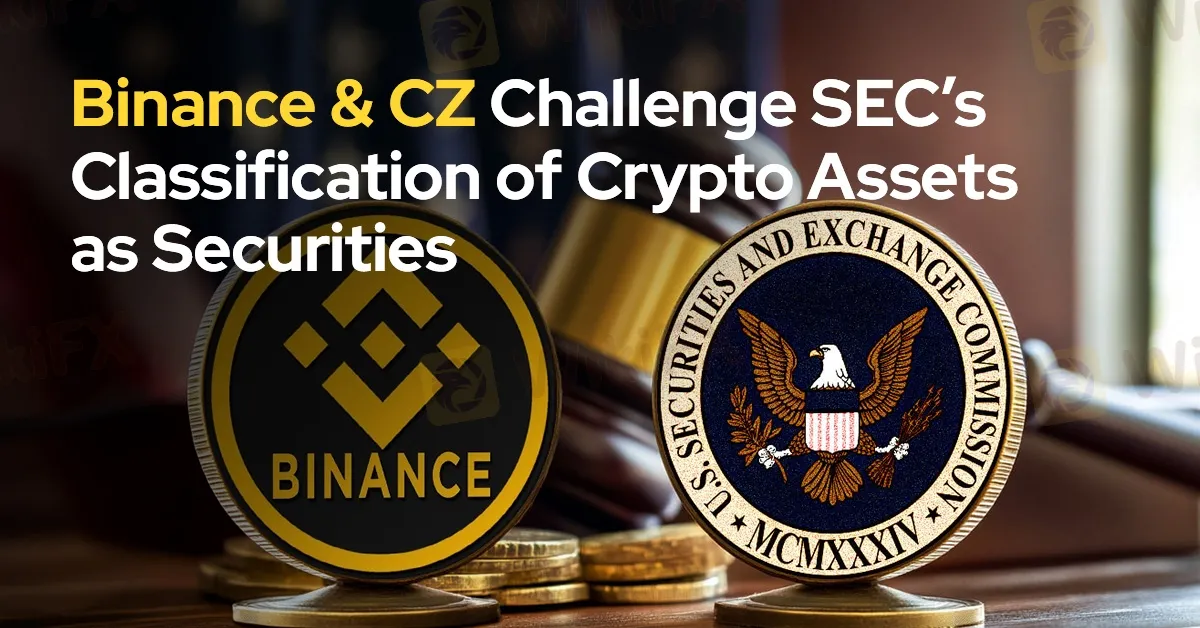简体中文
繁體中文
English
Pусский
日本語
ภาษาไทย
Tiếng Việt
Bahasa Indonesia
Español
हिन्दी
Filippiiniläinen
Français
Deutsch
Português
Türkçe
한국어
العربية
Binance & CZ Challenge SEC’s Classification of Crypto Assets as Securities
Abstract:In a November 4 filing, legal representatives for Binance and its CEO Changpeng Zhao (CZ) contested the Securities and Exchange Commission’s (SEC) amended complaint, asserting that the SEC merely pays “lip service” to a court ruling that excludes crypto assets from the definition of securities. The lawyers argue that despite this ruling, the SEC has continued to disregard its implications on digital asset trading

In a November 4 filing, legal representatives for Binance and its CEO Changpeng Zhao (CZ) contested the Securities and Exchange Commissions (SEC) amended complaint, asserting that the SEC merely pays “lip service” to a court ruling that excludes crypto assets from the definition of securities. The lawyers argue that despite this ruling, the SEC has continued to disregard its implications on digital asset trading.
The court previously determined that cryptocurrencies do not qualify as securities, implying that secondary market resales of these assets should not be classified as securities transactions. However, Binance‘s legal team contends that the SEC’s amended complaint persists in labelling nearly all crypto transactions—including secondary market resales of tokens—as securities transactions. This stance is based on the premise that some investors might anticipate an increase in asset value.
Furthermore, the filing highlights that the SECs amended complaint fails to provide a clear legal distinction between assets and investment contracts. The lawyers argue that assets should not be deemed investment contracts merely because they are presented to customers within a framework of promises and expectations. They emphasize that the SEC has not established definitive standards to guide courts, litigants, or market participants in determining which digital asset transactions qualify as investment contracts.
Binances attorneys also criticize the SEC for what they describe as arbitrary decision-making, referencing a recently abandoned case where Ether transactions were initially classified as investment contracts. The legal team points out that the SEC has acknowledged its own inability to differentiate securities from non-securities like Beanie Babies at the pleading stage.

The document further elaborates on the arguments against the SEC‘s cases involving Binance and CZ, ultimately requesting the dismissal of the SEC’s claims without allowing for any amendments. This follows an amended complaint filed by the SEC in September, where the agency clarified that it did not intend to label cryptocurrencies and tokens as securities outright. The SEC admitted to using the term “securities” as a broad reference to various aspects of crypto sales and later committed to using the term “crypto asset securities,” apologizing for any resulting confusion.
The legal battle dates back to June 5, 2023, when the SEC filed a lawsuit against Binance, CZ, and several affiliated companies for allegedly violating securities trading regulations. The SEC based its allegations on a court document that recognized Binances BNB token and the BUSD stablecoin as securities. Binance is not alone in facing such legal challenges; the SEC has also filed lawsuits against other major crypto entities like Coinbase and Ripple, accusing them of offering unregistered crypto asset securities.
As the dispute continues, the outcome of Binance and CZs legal efforts could have significant implications for the broader cryptocurrency market and the regulatory framework governing digital assets.

Disclaimer:
The views in this article only represent the author's personal views, and do not constitute investment advice on this platform. This platform does not guarantee the accuracy, completeness and timeliness of the information in the article, and will not be liable for any loss caused by the use of or reliance on the information in the article.
Read more

Bybit Shuts Down NFT Marketplace Amid Crypto Market Downturn
Bybit announces the closure of its NFT marketplace, citing efforts to streamline offerings. Discover the latest trends in the declining NFT market and its shift to utility-based growth.

Galaxy Digital Settles $200M in Luna Token Manipulation Case
Galaxy Digital pays $200M to settle Luna token manipulation probe by NY regulators, linked to TerraUSD’s 2022 crash, impacting crypto market stability.

Vanuatu Passes VASP Act to Regulate Crypto and Digital Assets
Vanuatu's new VASP Act regulates crypto businesses, enforcing strict licensing, AML/CFT compliance, and investor protections.

Blockchain Decentralization: Empowering a Trustless Future
In recent years, blockchain technology has rapidly evolved from a niche innovation behind Bitcoin into a transformative force across industries. At its core, blockchain decentralization refers to the distribution of authority and decision-making away from a central entity and into the hands of a distributed network of participants. This shift redefines how data is stored and verified and paves the way for trustless, transparent, and resilient systems that challenge traditional centralized models.
WikiFX Broker
Latest News
Exposing the Top 5 Scam Brokers of March 2025: A Closer Look by WikiFX
Gold Prices Climb Again – Have Investors Seized the Opportunity?
Webull Launches SMSF Investment Platform with Zero Fees
Australian Regulator Warns of Money Laundering and Fraud Risks in Crypto ATMs
The Withdrawal Trap: How Scam Brokers Lure Victims into Paying More
FCA to Investors: Think Twice Before Trusting These Brokers
Trump\s tariffs: How could they affect the UK and your money
Trump gambles it all on global tariffs he\s wanted for decades
HTFX Spreads Joy During Eid Charity Event in Jakarta
How Will the Market React at a Crucial Turning Point?
Currency Calculator







